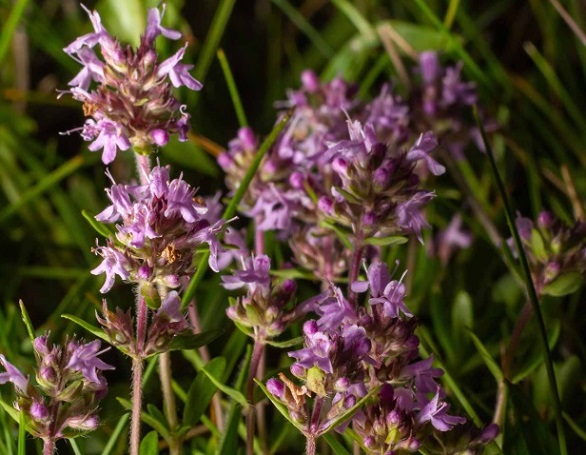Thymus vulgaris extracts show strong potential as natural anti-inflammatory agents
Nikhil Prasad Fact checked by:Thailand Medical News Team Feb 04, 2025 2 months, 1 week, 2 days, 10 hours, 54 minutes ago
Medical News: The Power of Thymus vulgaris in Combating Inflammation
A new study has highlighted the promising anti-inflammatory potential of Thymus vulgaris, commonly known as thyme. Researchers from Université Moulay Ismail de Meknes in Morocco have investigated the effects of different thyme extracts on key enzymes linked to inflammation. The findings suggest that thyme extracts could serve as natural alternatives to synthetic anti-inflammatory drugs, potentially reducing the risk of side effects associated with conventional treatments.
 Thymus vulgaris extracts show strong potential as natural anti-inflammatory agents
Investigating the Anti-Inflammatory Effects of Thyme
Thymus vulgaris extracts show strong potential as natural anti-inflammatory agents
Investigating the Anti-Inflammatory Effects of Thyme
This
Medical News report focuses on the study, which evaluated thyme extracts sourced from different regions in Northern Morocco. The research team tested the extracts using two different solvents, ethanol and ethyl acetate, to determine which method yielded the highest anti-inflammatory properties. The study specifically looked at how these extracts inhibited 5-lipoxygenase (5-LOX), an enzyme involved in inflammatory processes, and their interactions with cyclooxygenase (COX-1 and COX-2) enzymes.
The researchers performed in vitro assays to measure the inhibition of 5-LOX activity by thyme extracts. They discovered that ethanol extracts exhibited significantly stronger inhibitory effects than ethyl acetate extracts. Among the samples, the extract from the Meknes region (TV2) displayed the highest activity, with an IC50 value of 51.131 µg/mL. This means that the Meknes extract was particularly effective in blocking 5-LOX, an enzyme responsible for producing inflammation-inducing molecules.
Unlocking the Potential of Thyme's Bioactive Compounds
To further explore thyme’s anti-inflammatory potential, the researchers used computational analysis to examine its bioactive compounds, including thymol, carvacrol, and p-cymene. These compounds were assessed for their ability to interact with COX-1 and COX-2 enzymes, which play a major role in inflammation and pain regulation.
Molecular docking studies revealed that thymol demonstrated a strong binding affinity for COX-2, while carvacrol exhibited high affinity for COX-1. These findings indicate that these compounds may work similarly to common nonsteroidal anti-inflammatory drugs (NSAIDs) but with potentially fewer side effects. Molecular dynamics simulations confirmed that the enzyme-compound interactions were stable over time, further supporting the effectiveness of thymol and carvacrol as natural anti-inflammatory agents.
What Makes Ethanol Extracts More Effective
One of the key findings of the study was that the choice of solvent significantly influenced the anti-inflammatory potential of the thyme extracts. Ethanol extracts were found to be more potent than ethyl acetate extracts. This difference is likely due to ethanol’s ability to extract a wider range of bioactive compounds, including flavonoids and phenolic acids, which
are known for their anti-inflammatory effects.
Statistical analysis using Dunnett's multiple comparisons test confirmed that the ethanol extracts showed significantly greater inhibition of 5-LOX compared to the positive control, quercetin (p < 0.0001). These results emphasize the importance of selecting the right extraction method when developing plant-based anti-inflammatory treatments.
Implications for Future Research and Medicine
The study’s findings suggest that Thymus vulgaris extracts, particularly those obtained using ethanol, have great potential as natural anti-inflammatory agents. The combination of in vitro and in silico analyses highlights the possibility of developing thyme-derived compounds as safe and effective alternatives to synthetic drugs.
However, while the research offers valuable insights, further studies are needed to validate these findings in living organisms. Future research should include in vivo experiments and clinical trials to assess the safety, efficacy, and optimal dosage of thyme-derived treatments for human use.
Conclusion
The study underscores the powerful anti-inflammatory potential of Thymus vulgaris, particularly when extracted with ethanol. The bioactive compounds thymol and carvacrol show strong interactions with key inflammatory enzymes, making them promising candidates for the development of natural anti-inflammatory medications. The findings highlight the significance of solvent selection in optimizing the therapeutic properties of plant extracts. With further research, thyme could become a valuable component in the treatment of inflammation-related conditions, offering a natural alternative with fewer side effects compared to traditional NSAIDs.
The study findings were published on a preprint server and are currently being peer reviewed.
https://www.researchsquare.com/article/rs-5925474/v1
For the latest on Herbs and Phytochemicals, keep on logging to
Thailand Medical News.
Read Also:
https://www.thailandmedical.news/news/lemon-balm-extract-shows-promise-in-reducing-brain-inflammation-from-high-blood-sugar
https://www.thailandmedical.news/news/lactoferrin-and-its-promising-role-in-combating-neuroinflammation-and-promoting-neuronal-health
https://www.thailandmedical.news/news/discovering-new-anti-inflammatory-potentials-in-basella-alba-fruits
https://www.thailandmedical.news/news/indonesian-scientists-explore-the-anti-inflammatory-potential-of-melaleuca-cajuputi-extract-in-fighting-covid-19
